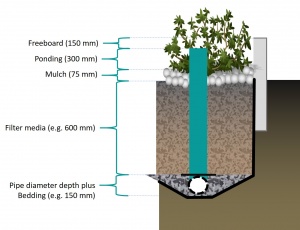Difference between revisions of "Planters: Sizing"
Jump to navigation
Jump to search
Jenny Hill (talk | contribs) (Created page with "thumb|A flow-through planter comprises a ponding zone, mulch layer, filter media for planting, and a supporting gravel drainage layer") |
Dean Young (talk | contribs) |
||
| (22 intermediate revisions by 2 users not shown) | |||
| Line 1: | Line 1: | ||
[[File:Sizing flow-through planter.jpg|thumb|A flow-through planter comprises a ponding zone, mulch layer, filter media for planting, and a supporting gravel drainage layer]] | [[File:Sizing flow-through planter.jpg|thumb|A flow-through planter comprises a ponding zone, mulch layer, filter media for planting, and a supporting gravel drainage layer]] | ||
This article is specific to flow-through [[Stormwater planters|stormwater planters]], vegetated systems that do not infiltrate water to the native soil. <br> | |||
If you are designing a planted system which does infiltrate water, see advice on [[Bioretention: Sizing]]. | |||
The dimensions of a stormwater planter are largely predetermined according to the function of the component. As they do not contain a storage reservoir the planters rely more upon careful selection of materials. Both the filter media and the perforations of the [[Pipe| pipe]] play critical roles for flow control. | |||
{| class="wikitable" | |||
|- | |||
! Component | |||
! Recommended depth (with underdrain pipe) | |||
! Typical porosity (''n'') | |||
|- | |||
| Ponding (''d<sub>p</sub>'') | |||
| 150 to 450 mm | |||
| 1 | |||
|- | |||
| [[Mulch]] | |||
| 75 ± 25 mm | |||
| | |||
* 0.7 for wood based | |||
* 0.4 for stone | |||
|- | |||
| [[Bioretention: Filter media|Filter media]] (''d<sub>m</sub>'') | |||
| | |||
* 300 mm to support turf grass (and accept only rainwater/roof runoff) | |||
* 600 mm to support shrubs, flowering [[perennials]] and decorative [[grasses]] | |||
* 1000 mm to support [[trees]] | |||
| | |||
* 0.35 for Blend A - Drainage rate priority; | |||
* 0.4 for Blend B - Water quality treatment priority | |||
|- | |||
| Pipe diameter reservoir | |||
| Is equal to underdrain [[pipe]] diameter | |||
| 0.4 | |||
|- | |||
| [[Choker course|Pipe bedding]] (''d<sub>b</sub>'') | |||
| 50 mm (although commonly omitted altogether). | |||
| 0.4 | |||
|} | |||
Latest revision as of 01:54, 14 July 2020
This article is specific to flow-through stormwater planters, vegetated systems that do not infiltrate water to the native soil.
If you are designing a planted system which does infiltrate water, see advice on Bioretention: Sizing.
The dimensions of a stormwater planter are largely predetermined according to the function of the component. As they do not contain a storage reservoir the planters rely more upon careful selection of materials. Both the filter media and the perforations of the pipe play critical roles for flow control.
| Component | Recommended depth (with underdrain pipe) | Typical porosity (n) |
|---|---|---|
| Ponding (dp) | 150 to 450 mm | 1 |
| Mulch | 75 ± 25 mm |
|
| Filter media (dm) |
|
|
| Pipe diameter reservoir | Is equal to underdrain pipe diameter | 0.4 |
| Pipe bedding (db) | 50 mm (although commonly omitted altogether). | 0.4 |
